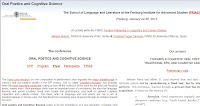In 2013, Stanford University held its first Code Poetry Slam, and its deadline for submissions closed on January 15 of this year.
Looks like an annual affair to watch.
Here is the school's description of the event:
Stanford University's Division of Literatures, Cultures, and Languages (DLCL) sponsors a series of Code Poetry Slams. Code Poetry Slam 1.0 was held on November 20th, 2013, and Code Poetry Slam 1.1 was held on February 27th, 2014, both in Wallenberg Hall, Rm. 124, at Stanford University. The following year, Slam 2.0 was held on January 23rd, 2015, also in Wallenberg 124.
What is "code poetry"? A C++ sonnet? A Haskell haiku? An algorithmic poetry generator? Something completely new? Check out our Resources tab for examples, theory, and other groups holding similar events!






